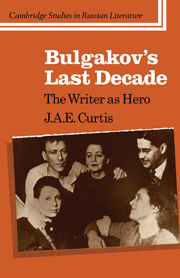4 - The Master and Margarita – ‘Manuscripts don't burn’
Published online by Cambridge University Press: 05 November 2011
Summary
‘At that point his guest clasped his hands together, as though in prayer, and said in a whisper: “Oh, it's just as I guessed it! It's all just as I guessed!’”
(550)Bulgakov's The Master and Margarita has a quality of rich complexity, the veins of which are still being explored. Both the novel's form and its themes mark it out as a unique masterpiece; parallels are hard to find either in Russian literature or in any West European traditions. This need not cause the critic to despair about finding the right slot in which to fit the work; it may be, indeed, that such an undertaking is doomed to prove unproductive. As one recent commentator on the novel has remarked:
Bulgakov's novel is indeed innovative to the highest degree … When you come to try on the garb of Menippean satire it covers some parts very well, but leaves others exposed; Propp's criteria for magical fairy-tales are applicable only to certain events, and relatively humble ones at that, leaving almost all the novel and its main heroes stranded; the fantastic stumbles over blatant realism; myth comes up against scrupulous historical accuracy; theosophy confronts demonism; romanticism meets with buffoonery.
While the work proclaims its individuality and resists attempts to find for it ancestors in earlier writings or siblings in contemporary texts, its thematic intricacy raises so many urgent questions demanding analysis and interpretation that the problem of genre recedes to a position of secondary importance.
- Type
- Chapter
- Information
- Bulgakov's Last DecadeThe Writer as Hero, pp. 129 - 187Publisher: Cambridge University PressPrint publication year: 1987



